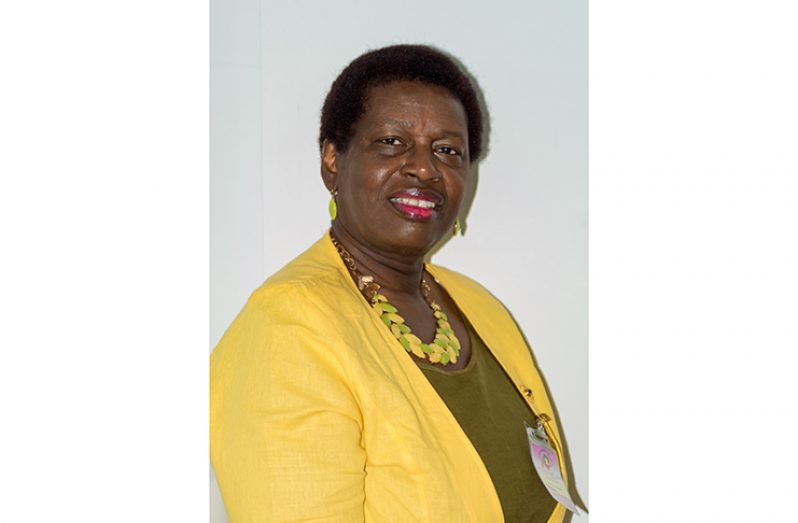– expert tells nurses’ conference
NURSES in Guyana must continuously work to improve their professional etiquette while monitoring their mental health, Family Nurse Practitioner (FNP) Dr Jacqueline Gulstone has said.
Dr Gulstone, who has racked up decades of experience in the profession since beginning studies in April 1976, now practises in Brooklyn, New York, even as she represents the Guyanese Nurses Association of America Inc.
During the Guyana Nurses Association (GNA) 90th anniversary and Global Guyanese Nurses Reunion Conference last week, Dr Gulstone sat down with the Guyana Chronicle to leave a direct message for local nurses.
One of the practices she said that nurses should avoid is the showing of favouritism to patients, based on their outward appearances or social and financial standing.
“There should not be a difference in the type of care that patients are given because of their status in life. If there is someone who is the executive of a specific company and someone who is a farmer, I should be able to give them the same standard of care,” Gulstone began.
She linked this counsel directly to the respect which must be shown to patients; an action which she observed is unequally spread across health institutions in Guyana.
A typical example she put forward is the case in which nurses fail to take the necessary time and effort to explain medical information to patients, who may be illiterate or unfamiliar with the simplest of medical jargon.
“One of my biggest pet peeves as a nurse is how we respect other patients. We can’t just dismiss a patient when they say something to us; they may not understand and you have a professional responsibility of going over that information with that patient, so that they understand,” she urged.
This form of respect, she added, must be extended to co-workers as well.
Younger nurses, she advised, must be willing to teach older nurses how to navigate the Internet and how to use new technology, while older nurses in turn ought to be willing to teach the younger ones the art of the practice.
And one thing that all nurses should know and live by is confidentiality.
Dr Gulstone took time to explain that patients must be able to trust nurses even as the profession has grown to be known as the most trustworthy throughout the years.
CONFIDENTIAL
“Patient information is confidential. The only time that patient information does not remain confidential or is not kept with you the nurse, is when the patient is suicidal or homicidal. Then, you need to get people on board.
“But you cannot have the patient’s private information and you’re going home to discuss it with your family or you’re telling another person. When that patient comes to you to talk, that patient comes to you in confidence knowing that you are going to protect them and protect their privacy,” she reminded.
Gulstone graduated as a registered nurse from the Georgetown School of Nursing and two years later, began working as a registered midwife prior to migrating to the U.S.
She has since furthered her career and holds a PhD in Nursing; a Master’s of Science in Nursing (MSN); Clinical Nurse Specialist (CNS) and Family Nurse Practitioner-Board Certified (FNP-BC).
Through the Guyanese Nurses Association of America Inc, local nursing students receive scholarships biannually and Gulstone said that even the advice she now provides is meant to encourage, rather than to chastise.
“It’s not about condemning our education system, but it’s about how we can enhance it… we are not here trying the [sic] rip things apart. This is our country, no matter how many years we’ve been away from home, it’s still home and we always think about how can we [connect] a line to help our people,” she said.
During her visit to the country, she delivered presentations on nurses and their mental health, which she said still remains a taboo topic across the medical field.
CAN BE STRESSFUL
“Nursing is a very stressful profession. It’s a lot of pressure physically and emotionally. At any one moment you don’t know what’s going to happen when you’re on duty. You may go in and a patient is fine and before you know it the patient is crashing, so you have to be the one to control your emotions,” Dr. Gulstone said
She continued: “Added to that, nurses work long hours… all of these factors can cause depression in nursing.”
Some of the tell-tale signs of depression she pinpointed were sleeping a lot or insomnia; eating very little or overeating; irritability; suicidal thoughts; threats to harm others; and voluntary seclusion.
“If a nurse is depressed, it is going to affect the quality of care that a nurse is going to give to that patient… and, if you don’t know what are the signs to look for, then you won’t know that you’re depressed. A nurse who is depressed can make a lot of errors, because you cannot focus; you have all those distractions, so we have to start looking for the signs. Nurses are always hesitant to let people know that they are having some problems in terms of mental healt, because they’re worried about their jobs… so instead they keep everything bottled up. But you have to seek professional help because it’s not going to go away, it’s just going to get worse. It’s not just about taking medication, but it has to be something holistic,” Gulstone said.



.jpg)










